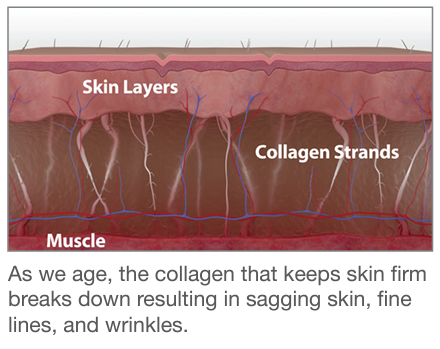Do Collagen Supplements Work?
Are collagen supplements a marketing gimmick or do they really work?
Dr. Michelle Hwang
5/25/20245 min read


Collagen: Its Role in Skin Health
Collagen is a crucial protein that forms the structural framework of various tissues in the human body, including skin, bones, tendons, and ligaments. It is the most abundant protein, accounting for approximately one-third of the body's total protein content. Collagen's primary role in skin health is to maintain its elasticity, hydration, and firmness, contributing to a youthful and resilient appearance.
In the skin, collagen fibers provide structural support, helping to maintain its shape and prevent sagging. This protein also plays a significant role in hydration by attracting and retaining moisture, ensuring the skin remains supple and smooth. However, the natural production of collagen begins to decline as early as our mid-20s. This reduction is a key factor in the development of common signs of aging, such as wrinkles, fine lines, and loss of skin firmness.


The concept of 'nutricosmetics' has emerged as a novel approach to enhancing skin health from within. Nutricosmetics are ingestible beauty products that target skin health by providing essential nutrients and compounds, such as collagen supplements. These supplements aim to compensate for the natural decline in collagen production, thereby promoting skin hydration, elasticity, and overall appearance.
Initial research findings on collagen supplementation, were however lackluster and the medical community's first reaction was not a positive one. However, recent studies as well as this large meta-analysis suggest promising outcomes. These studies have shown that regular intake of collagen supplements may improve skin elasticity, reduce the appearance of wrinkles, and enhance overall skin hydration.
While these findings are encouraging, it is important to understand that the efficacy of collagen supplements can vary based on factors such as dosage, form of collagen, and individual response. As the scientific community continues to explore the potential benefits of collagen supplementation, consumers are advised to consider these factors when choosing to incorporate collagen into their skincare regimen.
How Do Collagen Supplements Work?
Collagen supplementation has garnered significant attention for its potential to enhance skin quality and combat the signs of aging. Collagen, a structural protein, is essential for maintaining skin elasticity, hydration, and overall integrity. As we age, the natural production of collagen in the body diminishes, leading to wrinkles, sagging, and loss of skin firmness. This decline has spurred interest in collagen supplements as a means to replenish and support the body's collagen levels.
When ingested, collagen peptides are broken down into amino acids in the digestive system. These amino acids are then absorbed and transported to the skin, where they serve as building blocks for the synthesis of new collagen fibers. The 3 most important amino acids that form the building blocks of collagen are proline, glycine and hydroxyproline.
Studies suggest that collagen peptides can stimulate the body's own collagen production by activating fibroblasts, the cells responsible for producing collagen. This dual action—providing raw materials and boosting endogenous production—underpins the efficacy of collagen supplementation in improving skin quality.
Scientific research supports the benefits of collagen supplementation for skin health. Clinical trials have demonstrated that regular intake of collagen peptides can lead to significant improvements in skin hydration, elasticity, and reduction of wrinkles. For instance, a study published in the Journal of Cosmetic Dermatology reported that participants who consumed collagen supplements experienced a notable increase in skin elasticity after just eight weeks. Another study in the journal Skin Pharmacology and Physiology found that daily collagen intake improved skin hydration and reduced the depth of wrinkles.
Despite these positive findings, skepticism remains. Critics argue that the body may not use ingested collagen efficiently or that benefits observed in studies may be influenced by placebo effects. However, the growing body of evidence, including randomized controlled trials, lends credibility to the claims that collagen supplementation can enhance skin health.
In summary, while collagen supplements are not a panacea for all skin aging concerns, they offer a scientifically supported approach to improving skin quality. By enhancing collagen production and providing the necessary building blocks, these supplements can help maintain youthful, elastic, and hydrated skin.
Benefits of Collagen Supplements:
Hair, Nails, and Overall Health
Although the bodies of evidence that support hair and nail quality are less robust than its evidence in skin improvement, collagen supplements have also been shown to improve the strength and vitality of hair and nails. This in part may be due to the lack of high-quality research done specifically with regard to hair and nails as opposed to skin thus far.
So far, scientific studies have shown that regular intake of collagen can lead to noticeable improvements in hair thickness and growth and is superior to biotin. For instance, a study published in the Journal of Cosmetic Dermatology found that participants who consumed collagen supplements experienced significant increases in hair density and scalp coverage over a period of six months. This improvement is attributed to collagen's role in supporting the structure of hair follicles, thereby promoting healthier and more resilient hair.
Similarly, collagen supplementation has been linked to stronger and less brittle nails. A research study featured in the Journal of Dermatological Treatment observed that individuals taking collagen peptides reported a 12% increase in nail growth rate and a 42% reduction in the frequency of broken nails. These findings underscore the potential of collagen to enhance nail health by providing essential amino acids that fortify the nail matrix.
Beyond hair and nails, collagen supplements offer several additional health benefits. For instance, collagen is a critical component of joint cartilage, and its supplementation can aid in reducing joint pain and stiffness. According to a study in the International Journal of Medical Sciences, participants who took collagen supplements experienced a notable decrease in joint discomfort, suggesting collagen's role in maintaining joint health and mobility.
Collagen may also play a role in supporting bone density. Research published in "Nutrients" revealed that collagen peptides could help improve bone mineral density in postmenopausal women, suggesting that collagen supplementation may be beneficial in preventing osteoporosis. Additionally, collagen assists in muscle recovery by providing the amino acids necessary for muscle repair and growth, making it a supplement to consider for those involved in strenuous or bodybuilding physical activity.
Conclusion
Scientific evidence suggests that hydrolyzed collagen peptides are considered the most effective form of collagen supplementation due to their high bioavailability. These peptides are broken down into smaller, easily absorbable units that the body can utilize more efficiently. This makes them a preferred choice for individuals seeking to reap the benefits of collagen supplementation.
The evidence currently strongly supports hydrolyzed collagen peptides for skin health to improve elasticity, hydration, and firmness. There is growing evidence to show that it also supports hair, nails and even bone and muscles, although the evidence for these are still developing.
References:
Ohara H, Ichikawa S, Matsumoto H, et al. Collagen-derived dipeptide, proline-hydroxyproline, stimulates cell proliferation and hyaluronic acid synthesis in cultured human dermal f ibroblasts. J Dermatol 2010; 37: 330–338.
Proksch E,SeggerD,Degwert J,SchunckM,Zague V,OesserS. Oral supplementation of specific collagen peptides has beneficial effects on human skin physiology: a double-blind, placebocontrolled study. Skin Pharmacol Physiol 2014; 27:47–55.
Genovese L, Corbo A, Sibilla S. An insight into the changes in skin texture and properties following dietary intervention with a nutricosmeceutical containing a blend of collagen bioactive peptides and antioxidants. Skin Pharmacol Physiol 2017; 30: 146–158.
Czajka A, Kania EM, Genovese L, et al. Daily oral supplementation with collagen peptides combined with vitamins and other bioactive compounds improves skin elasticity and has a beneficial effect on joint and general wellbeing. Nutr Res 2018; 57:97–108.
Asserin J, Lati E, Shioya T, Prawitt J. The effect of oral collagen peptide supplementation on skin moisture and the dermal collagen network: evidence from an ex vivo model and randomized, placebo-controlled clinical trials. J Cosmet Dermatol 2015; 14: 291–301.
Sangsuwan W, Asawanonda P. Four-weeks daily intake of oral collagen hydrolysate results in improved skin elasticity, especially in sun-exposed areas: a randomized, double-blind, placebo-controlled trial. J Dermatolog Treat 2020; 9:1–6.


